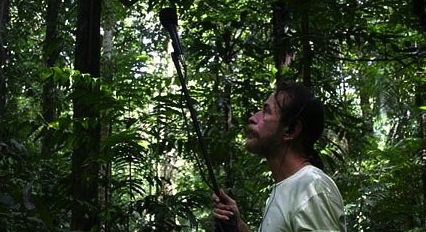
Albery Albuquerque Gives a Voice to the Amazon
14 February, 2012If you thought singing animals were reserved for animated Disney movies, think again. Albery Albuquerque and his son Thiago study animal sounds of Northern Brazil and compose music in the voices of their subjects. It’s a serious academic endeavor. “With music, we are opening a giant door into the world of science,” explains Albery.
Albery’s research is in the field of transmorphic music, sounds derived through and beyond the forms that we perceive. Anything that can be measured in some way has a corresponding sound and can be expressed as music. Albery names architectural music, geometric music, cosmic music, and biologic music as examples. Within the category of biologic music, you can use patterns in nature or animal sounds as the base for musical expression. Albery works primarily with animal sounds to compose what is known among experts in his areas as Universal Transmorphic Music of Language.
The name sounds like the subject of a sci-fi movie, I know. And while Albery may personally believe in a number of unearthly phenomena, he conducts his research using strict scientific method. In fact, he holds a number of honorary degrees from universities across Brazil for his pioneering methods and has been invited to international conferences to present his work.
Albery and Thiago record hours of animal vocalizations in remote areas of the Amazon rainforest and study their musical elements, such as rhythm, dynamic, sequence, interval, etc. They even consider the biologic significance of each sound. For example, does the animal make a noise before, during, or after a certain activity? Once Albery has thoroughly studied the animal’s vocalization and completely “immersed” himself in the animal’s form of expression, he can begin constructing what he calls “the animal’s school of music” and compose original songs within that structure.
Albery is careful to emphasize that he is not plagiarizing the animal sounds, but actually creating original music. He explains, “Bossa nova is a form of expression. You can compose bossa nova without copying Tom Jobim and at the same time not misrepresent it. You can also compose Uirapuru without plagiarizing the bird nor misrepresenting it, because the Uirapuru’s forms of expression are a school of music.”
The Uirapuru, or Music Wren, is native to Albery’s home state of Pará and the subject of much of his work. He’s composed a number of songs in the school of Uirapuru, but he’s also covered some popular musical numbers, including “Yesterday” by the Beatles, using the bird’s form of expression. Albery explains, “If the Uirapuru were to sing ‘Yesterday,’ it would sound like this.”
Right now, computers are an integral part of Albery’s composition process. But for someone whose music is all about the language of living things, this reliance on technology is not ideal. Albery freely admits that the computer takes away some of the soul of the sound. “A computer doesn’t breathe, it doesn’t have a pulse, it’s not a person.”
This is one of the reasons Albery is dedicating much of his time to creating a new wind instrument that would allow humans to play Uirapuru. “Noise makers that mimic duck sounds already exists. So why not make them for other animals?” The difference, Albery explains, is that these quack call noise-makers don’t allow for much control. Albery’s Uirapuru will allow the musician to strike all the notes that the bird sings in nature.
The Brazilian Ministry of Culture has already approved the project, which also includes plans for a training school to teach both the techniques of playing the instrument as well as the art of fabricating it. Albery dreams of creating an instrument for all 28 animal schools of music he and his son have already mapped, so that, one day, they can compose for an orchestra of amazonian animal instruments.
“This is environmental music. It fights for nature.” Humans need the animals to stick around, Albery argues, so we can continue to learn from them new languages for creating art.
Listen to more of Albery Albuquerque’s music on his Myspace page.
Watch a video about Albery (mostly in Portuguese) below:
Follow Sounds and Colours: Facebook / Twitter / Instagram / Mixcloud / Soundcloud / Bandcamp
Subscribe to the Sounds and Colours Newsletter for regular updates, news and competitions bringing the best of Latin American culture direct to your Inbox.

